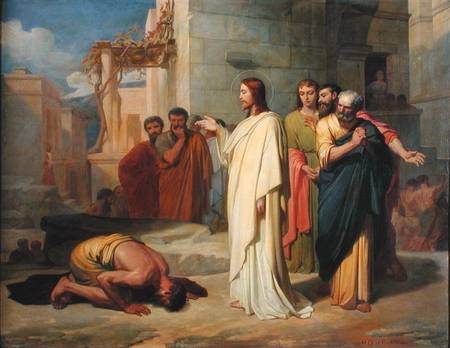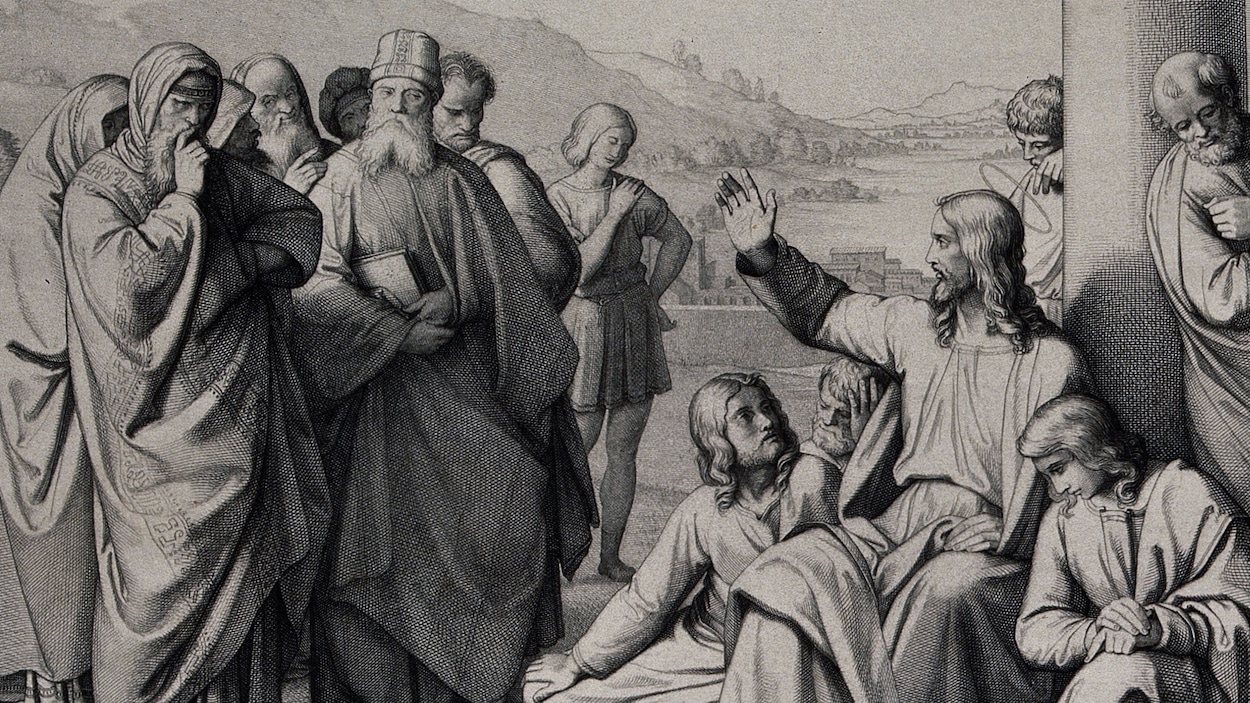For the 6th Sunday in Ordinary Time, the first reading (1 Lev 13:1-2, 44-46) along with the Gospel (Mk 1:40-45) passage speak of those who are outcasts, those who are literally cast out from the communities of Israel. In our society of today we have our own outcasts of a different sort, but nevertheless similar. In our day we have a few who are quarantined due to disease of illness. However they remain in our hospitals and so are not literally cast out. The same can perhaps be said for psychotics and others who suffer from mental disorders that threaten others in our society. We also have outcasts in our modern times who are imprisoned for long times because of the crimes they have committed.
A great debate in our time deals with what to do with illegal (not legal) immigrants. Should they be driven out of our country or should some accommodation be made for them, especially for their children who have been born while they were here within our borders? Should the length of time these illegals have spent here in the United States be an element in the equation of what to do with them? Just how are we to deal with the sheer numbers of them?
In the readings, it is important to note that lepers were those who had been literally cast out of normal Jewish social contact. But beyond the physical level the readings speak of sin and the healing of both physical and spiritual leprosy.
The response of Jesus is what is significant for us. The Gospel account tells us that Jesus touched the leper. It is the touching of the outcast that brought about his healing. Jesus reached out to him and touched him. It was a touch of gentleness; a touch filled with such fire and power that the sickness was burned away; it was a touch that gave new life, a whole new life to someone who was condemned to live in the hell of isolation and loneliness.
It needs to be pointed out again and again that we can read the Gospels in our daily lives, that the Gospels are like newspaper accounts of what is happening in our lives, they are accurate reports of what is happening in our lives and in our times. There are people today who have been driven out from their own families, ostracized by their own kin. And there are those who for one reason or another are shunned, shunned where they work, even shunned by their peers. Many kids in our high schools suffer from being shunned and cast out from the “in” crowds.
It needs likewise to be pointed out that in all too many instances those who do the casting out are themselves victims of sin, suffering from spiritual leprosy, and that all too often those who do the casting out are projecting on to the outcasts the very things that they fear can be found deep within themselves.
We need to ask ourselves some very uncomfortable questions. Do our jails rehabilitate inmates or do they merely keep inmates out of our clean society? If they do not rehabilitate, is there are sort of unwritten public policy behind the failure to rehabilitate? The most uncomfortable question of all is: To what extent are we honest with ourselves in recognizing our own leprosy, our own sinfulness?
The point of it all is that the outcast system, the social ostracism system, is breaking down. It is breaking down because mere outcasting is doomed to failure. It is doomed to failure because it has nothing to do with God, particularly God’s methodology for effecting cures of both social and personal evil.
Let me take us back now to the beginning of these observations. Jesus, the Gospel says, touched the leper. That’s the key… reaching out and touching the outcasts around us. Why? Because touch brings healing within it. Human contact, caring human contact, bears within it healing powers.
The outcast system of doomed to failure because it keeps the so-called healthy ones in a position of pride. It prevents them from recognizing their own need of a cure. It arrests them in the delusion that they are pure, and clean, and holy and without fault or defect. Yet how can they possibly cure anyone else unless they themselves are first cured? No, the social outcast system simply keeps as out of touch, out of communion, and out of the community of faith that God wills for us. Healing and wholesomeness, under such conditions become impossible.
In many of our families there’s someone who has been judged to be a leper; someone who has been cast out… judged to be incapable of any good, and coldly given up. “Well, we all know about Uncle Ed, don’t we? We all know what sort of a person he is!” “And then there’s that sister-in. law of mine. She’s always been an ungrateful, manipulating, grasping, selfish hypocrite! She’s not going to take any more advantage of me! I’m not going to be made the fool any longer. For her own good I’m not going to have anything further to do with her until she changes her attitude, admits her faults, and relates to me on my terms!”
As for Jesus? Well, He would have paused in front of these people, looked at them with so much faith, and loved them with a love that was so disarming, with such simplicity and gentleness, and with so much faith in the goodness in them that He would have brought forth from their callous-covered hearts inexpressible bursts of gratitude, wonder, and joy. And they would have been touched and healed.
Christ expected the best from everyone. When we expect only the worst then how will they ever be healed? Behind the most horrid of masks people wear, behind their most intricate of defense mechanisms, their most insufferable arrogance and bluffing and cursing and silence, there is a child who has never been loved enough and who has stopped growing. Behind the most leprous of sinners there is a fixated and arrested child whose developmental process can come to life with a touch of love. Every child stops developing precisely at the point where significant others have ceased believing in that child.
Touching another person with the love of God means giving them a vocation, a call, a summons. It means summoning from within them the most insistent of all calls in life; it means touching them and stirring up within them a little child who stopped wondering at life and who was therefore no longer either intellectually or emotionally curious about life or about others. To love someone is to call them, to invite them, to surround them, and to patiently and respectfully await their response, their change, and their renewal in growth. No social outcast system can ever hope to accomplish this miracle; no ostracism will ever work.
The outcasts, the so-called lepers in our lives, have to feel that they’re loved very deeply, very boldly, and very truly, before they dare appear to be humble and gentle and kind and affectionate and vulnerable. Only the strong can afford these virtues, only the healthy have the where-with-all to transmit those strengths, those virtues. For the call of Christ demands that the strong share their strength with the weak, the healthy share their health with the lepers, and the holy share their holiness with the sinners. This system is the direct opposite to the system of this world, namely the outcast system. For truly God’s ways are not our ways.
The question for you and me today, my brothers and sisters, is this: Dare we take the risk and reach out and touch the lepers in our lives? Do we have enough faith in ourselves to take that risk, or enough faith in God to dare to touch His lepers? Salvation for our society as well as our own personal salvation hangs or falls on the answer to that question.








